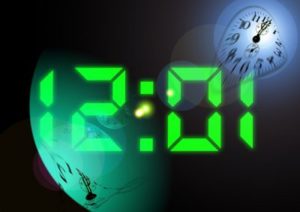Physics of Time

Physics is the only science that explicitly studies time, but even physicists agree that time is one of the most difficult properties of our universe to understand. Even in the most modern and complex physical models, though, time is usually considered to be an ontologically “basic” or primary concept, and not made up of, or dependent on, anything else.
In the sciences generally, time is usually defined by its measurement: it is simply what a clock reads. Physics in particular often requires extreme levels of precision in time measurement, which has led to the requirement that time be considered an infinitely divisible linear continuum, and not quantized (i.e. composed of discrete and indivisible units). With modern atomic time standards like TAI and UTC (see the section on Time Standards) and ultra-precise atomic clocks (see the section on Clocks), time can now be measured accurate to about 10−15 seconds, which corresponds to about 1 second error in approximately 30 million years.
But several different conceptions and applications of time have been explored over the centuries in different areas of physics, and we will look at some of these in this section.
In non-relativistic or classical physics, the concept of time generally used is that of absolute time (also called Newtonian time after its most famous proponent), time which is independent of any perceiver, progresses at a consistent pace for everyone everywhere throughout the universe, and is essentially imperceptible and mathematical in nature. This accords with most people’s everyday experience of how time flows.
However, since the advent of relativity in the early 20th Century, relativistic time has become the norm within physics. This takes into account phenomena such as time dilation for fast-moving objects, gravitational time dilation for objects caught in extreme gravitational fields, and the important idea that time is really just one element of four-dimensional space-time.
Relativity also allows for, at least in theory, the prospect of time travel, and there are several scenarios which allow for the theoretical basis of travel in time. There are even theoretical faster-than-light time-travelling particles like tachyons and neutrinos. However, the concept of time travel also brings with it a number of paradoxes, and its likelihood and physical practicality is questioned by many physicists.
Quantum mechanics revolutionized physics in the first half of the 20th Century and it still represents the most complete and accurate model of the universe we have. Time is perhaps not as central a concept in quantum theory as it is in classical physics, and there is really no such thing as “quantum time” as such. For example, time does not appear to be divided up into discrete quanta as are most other aspects of reality. However, the different interpretations of quantum theory (e.g. the Copenhagen interpretation, the many worlds interpretation, etc) do have some potentially important implications for our understanding of time.
Most physicists agree that time had a beginning, and that it is measured from, and indeed came into being with, The Big Bang some 13.8 billion years ago. Whether, how and when time might end in the future is a more open question, depending on different notions of the ultimate fate of the universe and other mind-bending concepts like the multiverse.
The so-called arrow of time refers to the one-way direction or asymmetry of time, which leads to the way we instinctively perceive time as moving forwards from the fixed and immutable past, though the present, towards the unknown and unfixed future. This idea has it roots in physics, particularly in the Second Law of Thermodynamics, although other, often related, arrows of time have also been identified.